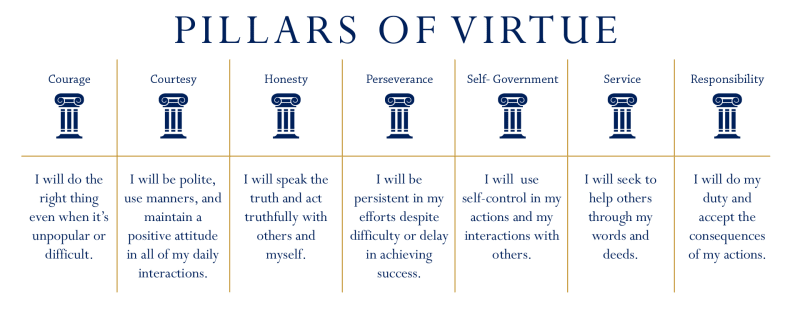By Dr. Dan Sturdevant

WHATEVER ONE OF US ASKED THE OTHER TO DO – IT WAS ASSUMED THE ASKER WOULD WEIGH ALL THE CONSEQUENCES – THE OTHER WOULD DO. THUS ONE MIGHT WAKE THE OTHER IN THE NIGHT AND ASK FOR A CUP OF WATER; AND THE OTHER WOULD PEACEFULLY (AND SLEEPILY) FETCH IT. WE, IN FACT, DEFINED COURTESY AS ‘A CUP OF WATER IN THE NIGHT’. AND WE CONSIDERED IT A VERY GREAT COURTESY TO ASK FOR THE CUP AS WELL AS TO FETCH IT.
SHELDON VANAUKEN, “A SEVERE MERCY”
Hello Parents, Scholars, Friends, and Optima Family!
Welcome to the second installment in our series of seven virtue-focused posts, reflecting the seven virtues we strive to instill each day at Optima Academy Online. This entry will discuss courtesy – often one of the more overlooked virtues – and something that is far too often forgotten in today’s public discourse. In the Vanauken quote above, we find a beautiful and uncommon description of courtesy, specifically in that it defines courtesy as reciprocal. That’s not something we often associate with courtesy, but if we are truly striving for courteousness, it is essential to consider it a reciprocal virtue. Please stick with me, and I’ll expand that thought.
First, in the instance of the quote above, Vanauken is describing his blossoming relationship with his bride, and how they desired to be courteous to one another at all times, and in all ways – even to the point of appreciating being woken in the night to fetch the other a glass of water. You may be asking yourself, how can we consider it a courtesy to be asked to fetch a glass of water in the middle of the night? While I am not acquainted with Mr. Vanauken except through his writing (and I might add that if you have not read “A Severe Mercy” but are in the mood for a spectacular and moving memoir, you should add it to your list) I believe the answer is that it affords the fetcher the opportunity to be of service. What more do we want in our relationships than to be useful, to be needed, and to offer value to those around us?
However, giving another the opportunity to serve must not become blanket permission to exploit the desired courtesy or good nature of our friends and colleagues. No, to be courteous, a request for service must afford the opportunity to serve, but also must be accompanied by humility, generosity, and the willingness to reciprocate. In short, the courtesy of a request must come after discernment of the opposite parties desire to serve, and once identified, the request becomes permission and opportunity for the server to be courteous in turn.
A wonderful and common example of this can be found in my childhood desire to open doors for students who came through the entrance to the cafeteria at my boarding school home. Though all of the students were older than me, perfectly capable of opening the door for themselves, and usually in some kind of a hurry, they would often stop, and wait for me to open the door for them. They offered me a small and common courtesy of asking (verbally or otherwise) for me to offer a service (opening the door), because it was my desire to be useful, and courteous in turn.
Second, consider my colleague Adam Mangana’s signature phrase “the common courtesy of connection.” Courtesy is found in connection, which implies a mutual relationship of courtesy. We can offer kindness and greetings, and many other things that define a social interaction without being courteous. As we have discussed above, courtesy is a reciprocal action, and as such, must include care, consideration, or a sought connection with another. For each of our virtues, virtuous behavior is an intentional decision at first, and our hope is that the behavior will become a habit; courtesy is no different. The difference between a courteous action and a simple greeting or interaction is in the intent – courteous actions move a relationship forward, build capacity and rapport, and communicate care. As we raise up this generation of leaders and scholars, what a gift it will be for them to habitually care for those they engage in discussion and discourse – offering to serve, and the opportunity to be of service. What a pleasant diversion from today’s social norms it will be to communicate care and decency in each interaction.
Thank you for reading, and as always, please reach out to info@optimaclassical.org with your questions.
Warmly,
Dr. Dan Sturdevant
Head of School



